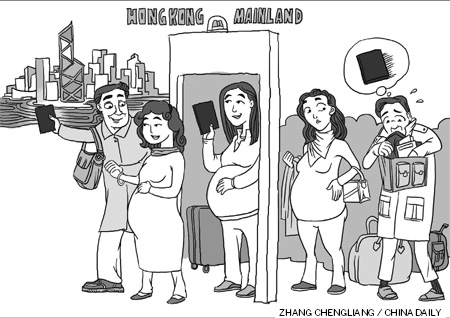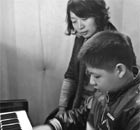Focus
Delivery in Hong Kong still popular
By Wang Wen (China Daily)
Updated: 2010-03-02 13:16
 |
Large Medium Small |
Mainlanders once again flock south to give birth after restrictions lifted
The flood of pregnant mainland mothers going to Hong Kong to give birth is back up to full steam this year, after the Hong Kong Hospital Authority stopped allowing non-Hong Kong residents to book public hospital beds for deliveries from Oct 9 to Dec 31 last year. The temporary move was to ensure enough beds for Hong Kong women during what authorities say is the peak delivery period.
|
 |
The Hong Kong Special Administrative Region Court of Final Appeal ruled on July 20, 2001 that any baby born in Hong Kong was automatically eligible for permanent residence. Since then an increasing number of pregnant mainland women have flocked to Hong Kong to give birth, guaranteeing Hong Kong residency for their babies.
About 33,000 mainland women gave birth in Hong Kong in 2008, accounting for around half of all births in Hong Kong in that year, according to the China News. The number was likely even higher in 2009. The figure for the full year is not yet available but 16,724 mainland women gave birth in Hong Kong in the first half of 2009, according to a report from the Hong Kong Hospital Authority.
The Hong Kong government has taken some measures to control the number of pregnant women delivering in Hong Kong. The price of basic obstetric services for non-Hong Kong resident women, including antenatal diagnosis (pre-birth testing for potential health conditions), delivery and three days stay in hospital, increased to 39,000 Hong Kong dollars ($5,023) on Feb 1, 2007.
However, the price increase did little to stop the stream of expectant mainland mothers.
Despite the temporary measures, the Hong Kong government is still keen to have mainland mother give birth there because of its low birth rate, according to the Hong Kong Information Service Department.
Anthony Wu Ting-yuk, president of the Hong Kong Hospital Authority even outlined in the Southern Metropolis Daily on Jan 5 how pregnant mainland women can give birth in Hong Kong without using agencies.
Pregnant women, who want to deliver in Hong Kong, need to receive a prenatal examination in public or private hospital in Hong Kong and make an advanced payment of 39,000 Hong Kong dollars to get a confirmation certificate. Most women opt to do the examination very early in the pregnancy because Hong Kong customs will not let pregnant women enter without the certificate.
Women who have the certification are allowed to travel from the mainland to Hong Kong while pregnant and usually get a two-night stay during the delivery.
According to the Hong Kong Hospital Authority, in cases involving miscarriage, termination of pregnancy or stillbirth, a partial refund of up to 20,000 Hong Kong dollars may be made.
However, many pregnant women still prefer to use agencies because they are not familiar with Hong Kong.
Many agencies post their advertisements online and offer different levels of services. Basic services include booking beds and doing the paper work for the baby to get permanent residence. Usually the agencies will arrange cars to pick up pregnant women in Shenzhen and take them to Hong Kong. The agencies also often arrange accommodation in Hong Kong and Shenzhen for families before and after delivery. Some agencies say they can slip obviously pregnant women without certificates through Hong Kong customs.
Most agencies use private hospitals, instead of public ones, where delivery charges can be as high as 80,000 yuan.
A manager from an agency in Beijing, surnamed Dong, said the profit margin of most agencies - which usually charge between 80,000 yuan and 150,000 yuan - is relatively low since most of the money is passed on as the fees to the hospitals.
"Most of our profit comes from renting out the apartments and cars," she said.
Rewards outweight costs
Statistics from the Hong Kong Census and Statistics Department show that about 98 percent of mainland parents who give birth in Hong Kong plan to bring their children back to the mainland after delivery, principally because most parents say they are unable to make a living in Hong Kong.
Babies born in Hong Kong automatically qualify for the Hong Kong permanent residency and the advantages, particularly the social welfare system, it entails.
But such babies raised in Beijing will be unable to use the mainland's social welfare system because China does not allow its citizens to have dual citizenship.
The exit and entry administration of the Beijing police said that children who are Hong Kong permanent residences can live in Beijing as non-local residents and they only need to update their home return permits in Hong Kong every three years.
The children must pay extra charges to study in Beijing, an official with the Beijing Municipal Commission of Education said. These extra fees currently amount to about 200 yuan ($24) per semester for primary school, 500 yuan per semester for middle school and 2,000 yuan per semester for high school. However top-ranked schools tend to charge more.
But such children will be able to study at a foreign university more easily and will be able to travel visa-free to 139 countries and regions.
Wang Wen







